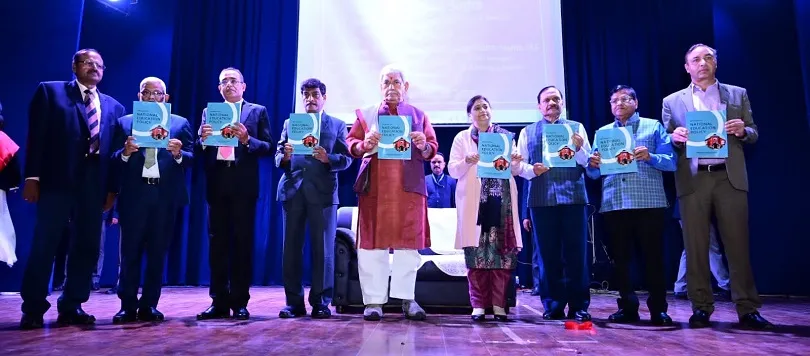Lieutenant Governor Manoj Sinha on Tuesday launched key initiatives of National Education Policy (NEP)-2020 in Jammu and Kashmir to prepare students for varied & comprehensive knowledge in a rapidly shifting world.
“Environmental, scientific, technological transformation & globalisation has increased the pace of socio-economic changes. Problem-based learning will make the students familiar with real-world situations & develop thinking and creativity skills,” the LG said, during an event held here on Tuesday.
Sinha underlined that Interdisciplinary curriculum and multi-disciplinary education are at the heart of NEP to train future innovators and leaders.
On this occasion, several MoUs were signed between J&K’s Higher Education Department with SKUAST-Jammu, SKUAST Kashmir, Jammu University, Kashmir University for sharing of agro based skills, and research based knowledge, life skills courses and mentoring of colleges respectively, to better equip the students.
“National Education Policy will play a significant role in making India a Knowledge super power. Since, the government educational institutions are equipped with requisite tools and resources at par with private institutions, we need to assess our national and global ranking and take corrective measures,” he said.
“The recommendations implemented in the UG Program of all the colleges from the 2022-23 session will bridge the gap between theoretical knowledge & practical skills, provide resources and choice for research and flexibility in completing degree programmes,” he added.
Highlighting the transformation taking place in the education sector under the leadership of Prime Minister Narendra Modi, the LG said that the future higher education & learning will be more dynamic, adaptable and personalized like a liquid learning model platform to seamlessly blend the ideas from different disciplines to prepare students for varied & comprehensive knowledge in rapidly shifting world.
He also emphasized that teachers-students need to capitalize on the advances in Science & Humanities for reorganizing classrooms and working world experience with focus largely on research and values that provide skills and knowledge relevant for today and tomorrow.
“National Education Policy promotes collaborations between disciplines to foster innovation and creativity. In future sustainable technological advances will be driven by people having an interdisciplinary approach,” he said, while stressing on development of future-oriented skills among the youth, promoting research and strengthening the academia-industry relationship.
“Degree Colleges shall be encouraged to start the skill development courses identified from the skill sector council under the National Skills Qualification Framework (NSQF). These courses shall be taught in partnership with industry where component of 12 credits taught by the College as professional knowledge and the component of 18 credits taken as professional training from industry. In the initial stage, 50 colleges have been identified to start the skill development courses,” he added.
The LG also asked the teachers and faculty members to promote the startup ecosystem in Higher Education. He further called upon students to nurture critical thinking.
Sinha also launched a book on “Implementing National Education Policy”. Principals of different Colleges were felicitated by the Lt Governor for getting NAAC accreditation.
| Quality journalism takes a lot of time, money and hard work to produce and despite all the hardships we still do it. Our reporters and editors are working overtime in Kashmir and beyond to cover what you care about, break big stories, and expose injustices that can change lives. Today more people are reading Kashmir Observer than ever, but only a handful are paying while advertising revenues are falling fast. |

